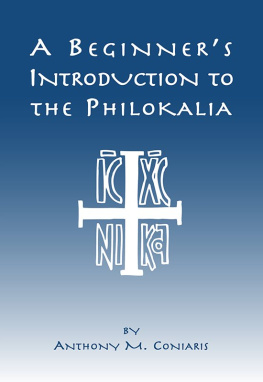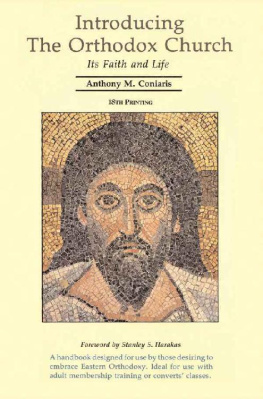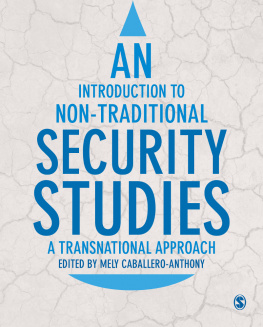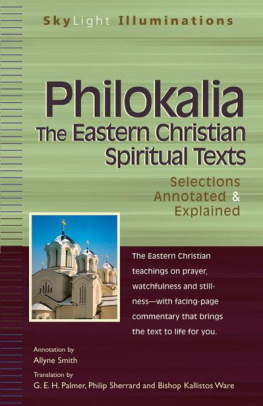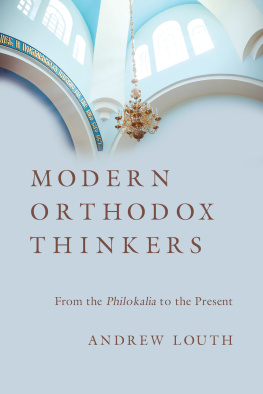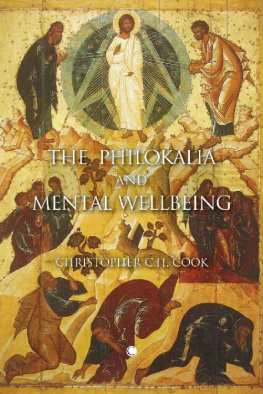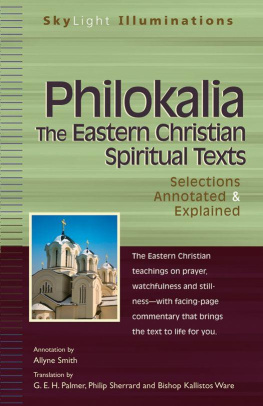Table of Contents
Light & Life Publishing Company
Minneapolis, MN
Copyright 2004
Light & Life Publishing Company
Fourth Printing 2017
Copyright 2017
eBook: Copyright 2021
Anthony M. Coniaris
All rights reserved. No part of this book may be reproduced, stored in a retrieval system, or transmitted in any form or by any means, electronic, mechanical, photocopying, recording, or otherwise without the written permission of Light & Life Publishing Company. The only exception is brief quotations in printed reviews.
ISBN: 978-1-933654-49-2 (eBook)
Table of Contents
Introduction
One of the many great treasures bequeathed to us by sacred tradition is the Philokaliaan anthology of spiritual writings by some thirty Church Fathers from the fourth to the fifteenth centuries. It was compiled by Sts. Macarios and Nicodemos on Mt. Athos in 1777 and printed in five volumes.
St. Nicodemos, one of its compilers, describes the Philokalia as a mystical school of inward prayer. The pilgrim in the spiritual classic The Way of a Pilgrim describes what the Philokalia meant to him in terms of tasting the sweetness of prayer that created in him a burning desire for union with God:
Ah, how much new knowledge, how much wisdom that I never yet possessed was revealed to me in this book. As I began to put it into practice I tasted a sweetness I could not even have imagined until now. Often I spent an entire day sitting in the forest carefully reading the Philokalia and learning many wondrous things from it. My heart burned with a desire for union with God through interior prayer.
The English translators describe the Philokalia in these terms:
The Philokalia is an itinerary through the labyrinth of time, a silent way of love and gnosis through the deserts and emptinesses of life, especially of modern life, a vivifying and fadeless presence. It is an active force revealing a spiritual path and inducing man to follow it. It is a summons to him to overcome his ignorance, to uncover the knowledge that lies within, to rid himself of illusion, and to be receptive to the grace of the Holy Spirit who teaches all things and brings all things to remembrance.
The following dialogue from The Way of a Pilgrim explains how the purpose of the Philokalia is not to replace but to explain the deeper meaning of Gods Word:
Read this book, [the elder] said. It is called The Philokalia, and it contains the full and detailed science of constant interior prayer, set forth by 25 holy Fathers. The book is marked by a lofty wisdom and is so profitable to use that it is considered the foremost and best manual of the contemplative spiritual life. As the revered Nicephoros said, It leads one to salvation without labor and sweat.
Is it then more sublime and holy than the Bible? I asked.
No, it is not that. But it contains clear explanations of what the Bible holds in secret and which cannot be easily grasped by our shortsighted understanding. I will give you an illustration. The sun is the greatest, the most resplendent and the most wonderful of heavenly luminaries, but you cannot contemplate and examine it simply with unprotected eyes. You have to use a piece of artificial glass which is many millions of times smaller and darker than the sun. But through this little piece of glass you can examine the magnificent monarch of stars, delight in it, and endure its fiery rays. Holy Scripture also is a dazzling sun, and this book, the Philokalia, is the piece of glass which we use to enable us to contemplate the sun in its imperial splendour. Listen now, I am going to read you the sort of instruction it gives on unceasing interior prayer.
Bishop Kallistos Ware counsels that the Philokalia is not an easy book to read. He advises the reader to prepare for it by beginning with two other books which consist of simpler texts from the Philokalia: Writings from the Philokalia on Prayer and The Art of Prayer by Igumen Chariton of Valamo.
To help the reader better understand the spirituality of the Philokalia, we shall now take a look at some of the principle terms one encounters in reading this classic, offering an explanation for each concept. These key words will serve to introduce the reader to the deeper meaning of the Philokalia.
Chapter One
WATCHFULNESS,
WAKEFULNESS, INNER
ATTENTION ( NEPSIS )
One of the major emphases of the Philokalia is inner watchfulness. The authors whose works are included in the Philokalia are often called the Wakeful or Neptic Fathers because of the great emphasis they place on inner wakefulness and alertness. The Greek word nepsis means vigilance, alertness.
Nepsis means to be completely present to where we are, just as a mother is completely present to the least sound of her baby in the crib, even as she talks on the phone or vacuums the rug.
The glory of God is a human being who is fully alive, said St. Irenaeus. Fully alive means fully awake, alert, vigilant and attentive to God. What is required, counsels St. Theophan the Recluse, is a constant aliveness to Godan aliveness present when you talk, read, watch or examine something.
Such watchfulness blocks demonic thoughts from invading the heart, enabling the mind to concentrate on the one thing needful (Luke 10:42). The mind of an attentive person is the sentry, the sleepless guardian, placed over the inner Jerusalem, wrote St. Seraphim.
The Desert Fathers tell the following story about vigilance:
Abba John the Dwarf gave this advice: Watching means to sit in the cell and always be mindful of God. This is what is meant by the words, I was on watch and God came to me (cf Matt. 25:36).
It is when we are on watch, vigilant and attentive, that God comes to us. The Fathers of the Philokalia counsel us that for attentiveness to be effective, it should be combined with prayer: proseuche (prayer) and prosoche (attentiveness). When vigilance discovers a thief seeking to break in, it immediately summons help through prayer (the Jesus Prayer).
The Fathers of the Philokalia advise us to post a guard at the gate of the mind and to be the doorkeeper of our heart.
St. Theophan the Recluse wrote:
After every thought has been banished from the soul by the memory of Gods presence, stand at the door of the heart and watch carefully everything that enters or goes out from there.
St. Nicodemos of the Holy Mountain issues a clarion call to guard all the senses which he calls gateways to sin:
St. Isaac has noted, the enemy is standing and observing day and night directly against our eyes to detect which entrance of our senses will be opened for him to enter. Once he enters through one of our senses because of our lack of vigilance, then this devious shameless dog attacks us further with his own arrows. We must also struggle to protect our senses because it is not only through curious eyes that we fall into the sin of desire and commit fornication and the adultery of the heart, as the Lord noted. There is also the fornication and the adultery of the sense of hearing, the sense of smell, the sense of taste, the sense of touch, and all of the senses together. Therefore, St. Gregory the Theologian has written in his heroic counsel to the virgin: Virgin, be truly a virgin in the ears, in the eyes and in the tongue! Every sense that wanders with ease, sins. St. Gregory of Nyssa also said, The Lord has spoken, I believe, about all the senses, so that following His words we can conclude that the one who hears lustfully, the one who touches and the one who uses every inner power in us (lustfully) to serve pleasure has actually committed them in his heart.



